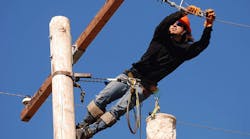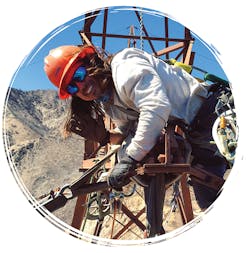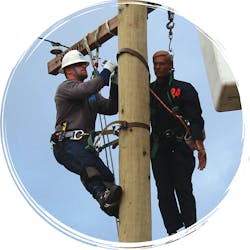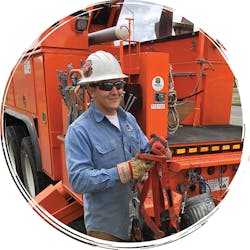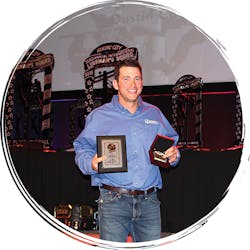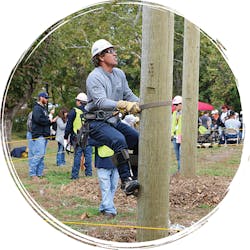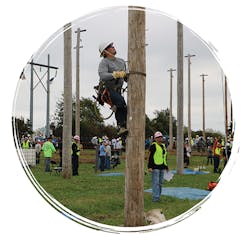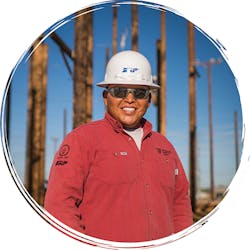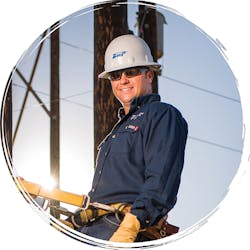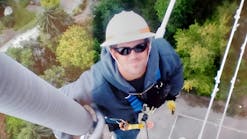Today’s line apprentices are tomorrow’s leaders in the electric utility industry. With veteran journeymen linemen nearing retirement, utilities are hiring apprentices to fill their work boots. Brandon Branch, an apprentice lineman for Pacific Gas and Electric Co. (PG&E), says he already is noticing an impending gap in the workforce.
“Soon, young linemen will have a majority of foremen who have 10 or 15 years in the trade instead of the 25 to 40 years in the trade like right now,” Branch said. “We will lose some of that experience as guys retire. We are lucky as well though, as we have new tools and work methods to make work easier and safer than it was for the men who came before.”
Apprentice lineman Chris Sanchez says a strong training program at Los Angeles Department of Water and Power (LADWP) is ensuring veteran linemen’s experience and expertise is shared with apprentices.
“We’re learning how to do the old-school rigging, and the linemen are passing on the knowledge,” Sanchez said.
Here are the stories of seven apprentices who already have made a mark on the line industry during their short time in the trade.
Climbing to the Top
One day can change the rest of your life. Case in point: As Sanchez was driving home from high school one afternoon, he saw linemen climbing power poles on the side of the road. That one moment led to a career in the line trade and top honors in the apprentice division at the International Lineman’s Rodeo.
“I knew nothing about the line trade before I saw the linemen working that day,” said 28-year-old Sanchez, who grew up in La Mirada, California. “I remember stopping my car and watching them for about 20 minutes. I knew it was dangerous work and that not a lot of people could do it. I just kept talking to people and asking them how to get into school, and then I just made it happen.”
After earning his high school diploma, Sanchez enrolled in a six-month course at the East Los Angeles Skills Center, where he learned to climb a power pole and perform rigging. He then spent four years as a groundman at Southern California Edison (SCE) before entering the apprenticeship program at LADWP.
“Working as a groundman helped me a lot, because I got to see everything firsthand,” said Sanchez, who will top out as a journeyman in December 2017.
While Sanchez is the first person in his family to pursue a career as a lineman, his younger brother is following in his footsteps by taking a course to become a groundman.
“My family loves it that I am in line work, and they are very proud of me,” Sanchez said.
Currently, Sanchez says he is replacing poles and upgrading wires to modernize LADWP’s system. While the poles he sets today may be replaced by his children one day, Sanchez gets a lot of satisfaction from helping his utility.
“Every time I drive by a pole that I set, I make sure it’s still there and in good condition,” he noted. “As an apprentice, you take pride in the work that you do and you feel good about doing it.”
Born to Be a Lineman
Brandon Branch, a third-generation apprentice lineman for PG&E, grew up in the industry. He always looked up to his late grandfather, who worked as a lineman for PG&E for nearly 40 years, and his father, who has served as a troubleman for PG&E for 29 years. But the family ties do not end there. His brother and cousin recently graduated from a lineman’s college, and he also has several uncles in the trade.
“The moment I started thinking about a career after military service, there was nothing else I wanted to do but to be a lineman,” said 26-year-old Branch, a former sergeant in the U.S. Marine Corps. “I knew I could earn a good living as a lineman and, at the same time, make a difference in people’s lives.”
Branch joined PG&E’s apprenticeship program in 2014 after serving in the Marines for five years and graduating from the Northwest Lineman College, where he served as class president. To get up to speed in the field, Branch read “books upon books upon books” and engaged in physical training. He also performed daily job responsibilities under the appropriate supervision.
“It’s amazing to see just how far you come in such a short amount of time,” said Branch, who grew up in Bakersfield, California, and now works in Chico, California. “The linemen I work with daily are amazing. They make seemingly impossible jobs look easy. I’m lucky to be with the group that I am.”
From day one, Branch has loved line work. The more he gets to know about the line trade, the more excited he becomes about his career choice.
“I am excited to pull on my boots every day,” Branch said. “It’s a dream come true to find a job with the kind of engaging work and camaraderie that this offers.”
Proud Marine and Lineman
Tacoma, Washington, native Ryan Streeter walked off the high school graduation stage and into the U.S. Marine Corps. Just before he joined, however, he met the business manager of the International Brotherhood of Electrical Workers (IBEW) Local 483 on a shopping trip to the mall to buy some work boots.
“We just started talking and she told me about the apprentice program,” Streeter said. “I joined the Marines shortly after, but I was always thinking about what she said. I was intrigued by working outside and working at heights, and I realized being a lineman was what I wanted to do.”
After attending a four-month program at Northwest Lineman College, he later built transmission lines for Source Helicopters and installed equipment as a cell tower climber for Cannon Construction Inc. Three years ago, he entered the apprenticeship program at Tacoma Power. Today, Streeter is working on one of the utility’s transmission crews to replace porcelain side-stack insulators with a newer, more lightweight polymer to modernize the system.
Over the last three years, the classroom training has prepared him for a career in the line trade, he says.
“The class work of the program really gives you the why and the how,” Streeter explained. “It gives you an understanding of why you have to do things a certain way, and it has made me feel more confident. I could be safe and get the work done.”
In today’s line trade, Streeter believes productivity and safety stem from knowledgeable, able line crews.
“If you don’t have qualified workers, then you’re not going to have productivity or safety,” Streeter said. “It’s about the training and the guys you have on your crew.”
In today’s competitive job market, Streeter says it is essential to either go to line school or have military experience to stand out from other applicants and gain some work experience.
“I’d like to think that the military helped me get my apprenticeship,” Streeter said. “Being in the military shows you’re trainable, know how to listen and can work with people.”
Hooked on Line Work
Apprentice Dustin Curry started out his career in the energy industry, but after high school, he was on track to become an electrician not a lineman. Straight out of high school, he entered the apprenticeship program at Kirkes Electric Inc., and while working on a job in an industrial building, he asked where the power comes from after the panel and meter.
When no one could answer his question, he decided to do his own research, and he called Northwest Lineman College. At that moment, he decided to shift direction and train to become a lineman.
“I didn’t know what I was getting into, but after my first day of climbing, I was hooked,” recalled Curry, who was born and raised in Turlock, California, and now works out of Stockton, California.
After graduating from Northwest Lineman College and getting hired on at PG&E, he learned line work was in his blood. His grandfather had worked as a lineman at Turlock Irrigation District and Modesto Irrigation District, and although Curry was never able to see his grandfather work as a lineman, he followed in his footsteps.
At PG&E, Curry spent one year as a pre-apprentice and then four years in the apprenticeship program. Every six months for about three weeks at a time, he and the other apprentices participated in training sessions at the utility’s Livermore training center.
“The training program that PG&E has and the instructors at Livermore are the best in the industry,” said 26-year-old Curry. “It’s challenging to find an apprenticeship program with linemen who have the years of experience to pass on and know how to explain everything, but I am fortunate to have that in Stockton and throughout PG&E.”
Compared to the linemen of the past, Curry says today’s apprentices have access to all battery-powered tools, which become lighter and better every day.
“It’s interesting to hear the older linemen talk about how they did jobs,” he said. “They didn’t have line trucks or buckets when they first started, compared to now, when we have all the tools we need to do our jobs safer, faster and with less wear and tear on our bodies.”
Carving His Own Path
Arizona native Jared Papa is blazing the trail as the first newly minted journeyman lineman in his family. Papa grew up in Snowflake, Arizona, and worked as a framer in the residential construction industry after high school. After the economic downturn, he looked for a more recession-proof career.
“Common sense told me everybody needs electricity, and I began researching jobs in the power industry,” said Papa, who got married at 22 years old and now has four children. “I found different lineman jobs posted around the country, and I researched the qualifications for them.”
After finding a training program in Arizona he could attend at a reasonable price, he entered the line trade and has not looked back.
“I have always loved working outdoors and working with others on a crew, and the work has far exceeded my expectations,” said Papa, who recently topped out as a journeyman lineman for Arizona Public Service (APS). “From going to line school to being a groundman and then serving as an apprentice, I have learned something new every day.”
Papa sees new technology and tools every day he can use in the field.
“I love seeing how these tools can help to make my job safer and easier,” he said. “Additionally, these emerging technologies provide great benefit to the customers we serve.”
For example, he says manufacturers are constantly making new and improved ways to splice cable. In fact, in the short time he has been doing line work, he has seen three new splices for doing 750 cables. In addition, he has seen significant improvements in the battery-operated tools like presses, cutters, drills and impact guns as well as the rotation, phasing and voltmeters.
Because of the constantly changing technology, linemen can be more productive in the field. Papa is currently working on a distribution maintenance crew to change out poles, transformers, crossarms, arresters and cutouts. In addition, his crew is working on underground cable replacement projects to change out old direct-buried cable with new cable in conduit.
“We respond to breaks on the grid and ensure the grid is performing smoothly, even at its peak,” Papa said. “APS has modernized the grid in many ways, and we’re continuing to move over to a smart grid, where sections of line can isolate and switch back both on their own and with supervisory controls.”
Son of a Lineman
Ever since he was seven years old, Devin Davis has wanted to work as a lineman, just like his dad. Now the 22-year-old does double duty as an apprentice lineman for APS and a member of the National Guard.
“My dad is my biggest influence when it comes to my choice of profession,” said Davis, who is originally from Las Vegas, Nevada. “He has been in the trade for 30-plus years, and the love he has for the craft has been passed down to me. It’s not just a job but a lifestyle.”
After attending basic training in the Army National Guard, Davis entered the apprenticeship program, which he describes as “extremely thorough.”
“From eight weeks of climbing school to six weeks of hot stick school, here at APS, they do not take training lightly. The program they have at APS gives you a lot of exposure to problem-solving skills and the many ways to work a line.”
Every three months, APS moves apprentices around the state to give them as much exposure as possible to different regions. Currently, he is working on a distribution maintenance crew out of Snowflake.
“Right now, we are continuing to increase the reliability of the system from Winslow to Snowflake to Show Low in Arizona,” Davis said.
Powering a New World
As a child, Myron Brady, an apprentice for Salt River Project (SRP), had no power or running water at home. During his junior year of high school, at the age of 16, he watched linemen build a power line to his house.
“Not having electricity makes everything so simple, and not growing up with it, I learned to survive in other ways,” 28-year-old Brady said. “But having it is so conventional that it really changed the world for me.”
His uncles, who worked as linemen for the Navajo Tribal Utility Authority, later trained him to do line work.
“I lived my whole life around the line trade,” he said. “They took me under their wing, and they taught me how to listen and be responsible for my own actions, which paid off. I still do that, and a lot of things go out to them.”
Growing up, Brady says he enjoyed working outside, and he learned from his uncles how to string wire, climb poles and dig holes.
“I was a little shaky at first, but they gave me all the confidence that I needed,” he said. “While they were free climbing, they wanted me to tie the belt off to be safe.”
Today’s apprentices are starting out learning how to climb poles using new fall restraints and full fall protection, he says. In addition, they are gaining experience working on new technology. In the future, he predicts further growth in the utility industry.
“A lot of the hands are older, and we are coming in to replace them,” said Brady, who placed fourth in the apprentice division at the 2016 International Lineman’s Rodeo. “The workforce will only increase.”
From the Warehouse to the Field
Every day, SRP Apprentice Jeff Weller watched linemen load up their material at the warehouse. Over time, his curiosity built up about the line trade and, eventually, he made the leap from the warehouse to the line division, where he started out as a line helper doing pole changeouts and maintenance.
“I fell in love with the trade and, from there, I figured out what it would take for me to become an apprentice,” said Weller, who tried the first year and did not get it but then was accepted the following year. “From there, every day has been a learning experience, and I have been learning something new every day.”
As an apprentice, he rotates every six months to different divisions.
“We bounce around and see new faces and new people in different ways” said 35-year-old Weller. “We are like sponges soaking up information.”
By being able to talk to veteran linemen, Weller is building up his knowledge base.
“SRP is a great company, and people who work there retire there, which is good for us apprentices,” Weller said. “We can work with the ladies and gentlemen who have been there a long time to get those skills, and they can pass down their knowledge to us. Because there is not a high turnover, there are a lot of resources we can reach out to.”
Fortunately, he says technology keeps evolving and improving, thereby increasing productivity for line crews.
“If you perform line work these days, you will see huge advancements in technology,” he said. “The key is to keep up on the next new thing that comes out and, if there are any issues, we need to fix them.” ♦
Sidebar: Seven Strategies for Apprentice Success
1. Constantly adapt to new tools and work methods. Arizona Public Service (APS) apprentice Jared Papa encourages apprentices to be well rounded in all aspects of line work — from overhead to underground to transmission to distribution to construction and maintenance. “It is all necessary and changes constantly,” Papa said. “You need to be adaptable to new ideas and new technology.”
2. Do not panic. Even if plan A and plan B do not work, apprentices should use their common sense and understand their utility’s practices and why they do them, says Chris Sanchez, an apprentice for Los Angeles Department of Water and Power (LADWP).
3. Learn something new every day. Pacific Gas and Electric Co. (PG&E) apprentice lineman Brandon Branch urges apprentices to know their standards, be proficient in the basics, be fluid, and watch everything and everyone. Branch says if he were to do the same project multiple times in a row, he would learn something on the first day that he could apply on the second day, and then see if he is even better at it on the third day. “A lot of the linemen I know are the same way, and it can become a daily competition,” Branch said. “You find that one buddy and he did it this fast, so now I have to do it that fast — safely, of course.”
4. Watch out for your brothers and sisters in the trade. Sometimes linemen and line apprentices can have off days, and during these times, it is especially important to keep them safe, Sanchez says.
5. Have a positive attitude. Without an optimistic outlook, an apprentice simply will not cut it, says Devin Davis, an apprentice for APS. Staying humble throughout the process is important to one’s success, Davis adds.
6. Pay attention and listen to the journeyman. Apprentices must always be on when they are at work, and they must have their head in the game, Davis says. “This can be a dangerous trade, and accidents can happen if you do not pay attention to every detail in the tailboard safety briefing,” he said.
7. Follow safety rules. Apprentices should always be alert and get as much training as possible, says Dustin Curry, an apprentice for PG&E.
Sidebar: A Glimpse into the Future of the Line Trade
New equipment, tools and machines will make linemen’s jobs safer. Just as the bucket truck has changed line work, the industry will continue to come up with new pieces of equipment and ideas to make work safer and more efficient, says Brandon Branch of Pacific Gas and Electric Co. In today’s world, he says fiberglass and ergonomic tools have made a real difference for linemen. Jared Papa, who recently topped out as a journeyman lineman for Arizona Public Service, expects the trade to stay constant for the next
20 years but for new and improved technology to continue to come on-line. “In 50 to 100 years, advanced technology will bring new and even more efficient ways to generate electricity,” Papa said.
Linemen will maintain more photovoltaic systems and distribution lines. In California, solar systems and Tesla’s Powerwall home battery packs are going onto houses, Branch says. “I see linemen maintaining solar systems and distribution lines in the next 20 to 50 years more than anything else,” he said. “And in 100 years, I could see linemen taking down more line than putting it up.”
More lines will be built underground. In the future, apprentice Jeff Weller of Salt River Project predicts the demand for both T&D power will keep growing and changing, but more customers will request underground systems. “We used to put poles up everywhere, but now customers don’t want to see any poles, so the power is going to underground,” Weller said. “As we expand, we definitely have to plan ahead to keep up with the demand for electricity for the customer.”
Smart meters will improve linemen’s productivity. When he worked for Southern California Edison, Chris Sanchez says the utility replaced all the meters with smart meters. “Rather than it being a guessing game, smart meters help us know a lot more about why we have outages,” he said.
Vehicles will become more energy efficient. Los Angeles Department of Water and Power is investing in hybrid trucks, which cut down on idling time, unnecessary engine noise and gas consumption. “While we will still be turning nuts and bolts as linemen in the future, I think we will continue to get safer and newer equipment.”
Infrastructure will last longer. Apprentices and journeymen linemen are replacing wood poles with steel and fiberglass structures to ensure they will have a longer lifetime, Sanchez says. “When you look at an old pole next to a new one, the new structure looks a lot sturdier,” Sanchez said. “We are installing fiberglass arms, putting in a lot of triplex and getting rid of open wire, and stringing heavier wire.”
